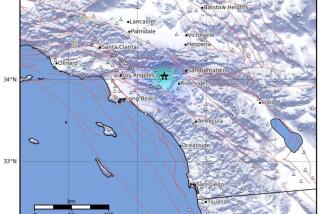Magnitude 3.2 earthquake hits off Malibu coast, the latest to hit Southern California

A magnitude 3.2 earthquake struck off the coast of Malibu on Saturday afternoon, the latest temblor this month to rumble along the Southern California coast.
Saturday’s earthquake was the seventh of magnitude 3 or greater since Sept. 12, when a magnitude 4.7 earthquake just north of Malibu was widely felt across Southern California, powerful enough that it briefly unsettled news anchors at KTTV-TV and KABC-TV who were broadcasting live.
But in contrast to most of the Malibu-area quakes that followed Sept. 12, which occurred under land, Saturday’s quake was offshore of Malibu, about 6 miles southwest of Point Dume.
Only “weak” shaking was felt in parts of Malibu on Saturday, according to the U.S. Geological Survey, as defined by the Modified Mercalli Intensity Scale. “Weak” shaking is generally defined as either being felt only by a few people at rest, or felt quite noticeably by people indoors.
Earthquakes are a way of life if you live in Los Angeles. But what about when you never feel them — even as your Shake Alert is blaring and your friends are buzzing about the temblor?
Before Saturday, the last earthquake in this area of magnitude 3 or greater was almost exactly a week ago — a magnitude 3.1 earthquake just north of Malibu, which hit on Sept. 21 at 2:15 p.m.
This has been an unusually active year for moderate earthquakes in Southern California. The Sept. 12 earthquake north of Malibu was part of the 14th seismic sequence this year in Southern California with at least one magnitude 4 or higher earthquake, seismologist Lucy Jones, a Caltech research associate, said earlier this month.
That broke a record for the last 65 years. Over that time period, Jones said, there was an average of eight to 10 independent sequences of earthquakes annually that included at least one temblor of magnitude 4 or greater.
In some years, there were just one or two of those earthquake sequences; the highest previous tally was 13 in 1988.
The observation is not necessarily an indication that a large, damaging earthquake is around the corner, scientists said. There have been dueling theories, with one being that earthquake activity increases in a region before a large earthquake, while another says seismic activity decreases before a large jolt.
So the recent activity does not offer any hint of when the next large, destructive temblor will occur, said Susan Hough, a U.S. Geological Survey seismologist, earlier this month.
Did you feel this earthquake? Consider reporting what you felt to the USGS.
Are you ready for when the Big One hits? Get ready for the next big earthquake by signing up for our Unshaken newsletter, which breaks down emergency preparedness into bite-sized steps over six weeks. Learn more about earthquake kits, which apps you need, Lucy Jones’ most important advice and more at latimes.com/Unshaken.
More to Read
Sign up for Essential California
The most important California stories and recommendations in your inbox every morning.
You may occasionally receive promotional content from the Los Angeles Times.












